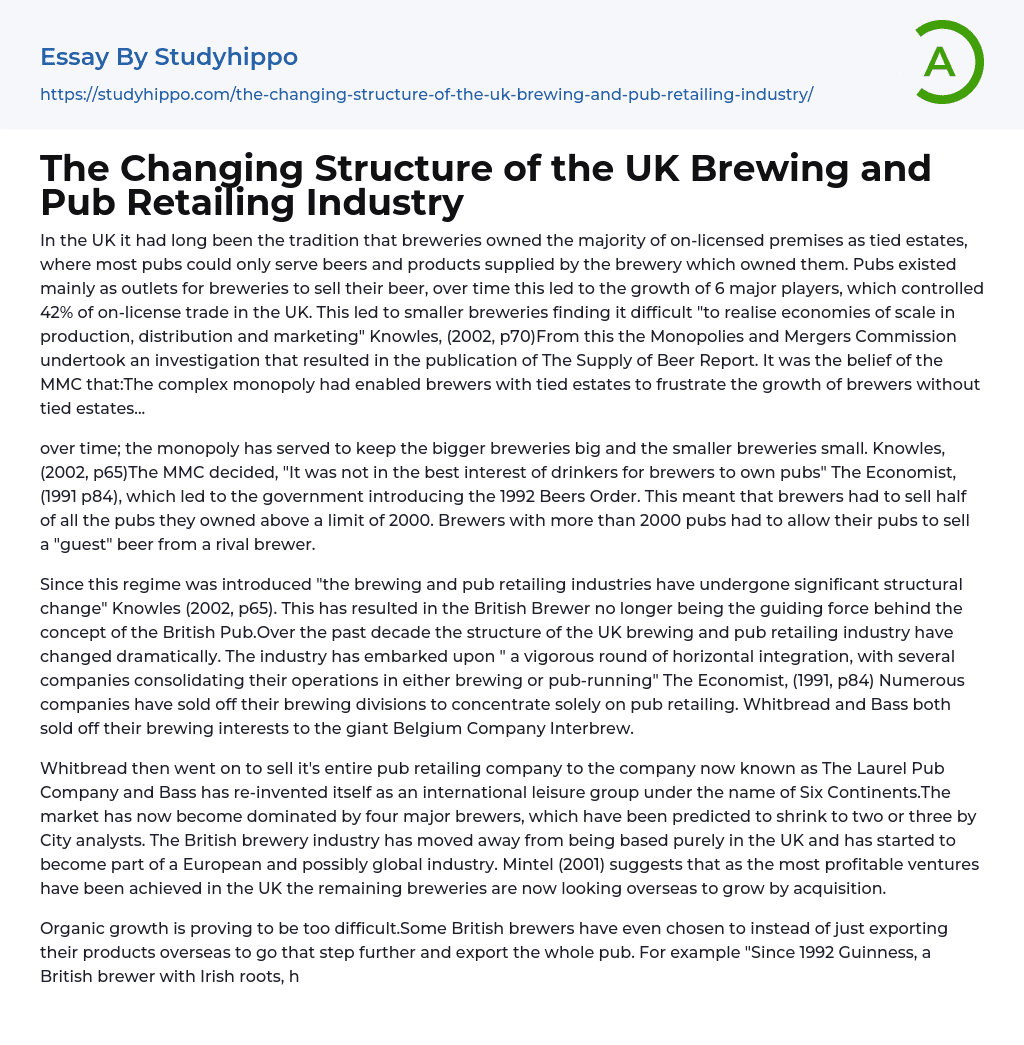

The Changing Structure of the UK Brewing and Pub Retailing Industry Essay Example
In the UK, it was customary for breweries to own the majority of on-licensed premises as tied estates. This meant that most pubs could only serve the beers and products supplied by the brewery that owned them. As a result, pubs mainly served as outlets for breweries to sell their beer, leading to the growth of six major players who controlled 42% of on-license trade in the country. This made it difficult for smaller breweries to realize economies of scale in production, distribution, and marketing. Knowles (2002, p.70) noted this effect. In response, the Monopolies and Mergers Commission launched an investigation that resulted in The Supply of Beer Report. The report concluded that the complex monopoly had enabled brewers with tied estates to hinder the growth of brewers without tied estates.
According to Knowles (2002, p65), monopolies have contr
...ibuted to maintaining the dominance of larger breweries and inhibiting the growth of smaller ones. The Economist (1991, p84) reported that the MMC stated brewers owning pubs was not advantageous for drinkers. Consequently, in 1992, the government introduced the Beers Order, requiring brewers to sell half of their pubs above a limit of 2000. Larger brewers with more than 2000 pubs also had to permit their pub to serve a "guest" beer from a competing brewery.
According to Knowles (2002, p65), the introduction of this regime has brought about significant structural changes in the brewing and pub retailing industries. As a result, the British Brewer no longer holds the dominant position in defining the concept of the British Pub. The last ten years have seen a considerable transformation in the configuration of the UK brewing and pub retailing industries
The industry has engaged in "a vigorous round of horizontal integration, with several companies consolidating their operations in either brewing or pub-running," as stated by The Economist (1991, p84). Many firms have divested their brewing divisions to concentrate solely on pub retailing, such as Whitbread and Bass, both of whom sold their brewing interests to the Belgian behemoth Interbrew.
After selling its pub retailing business to what is now known as The Laurel Pub Company, Whitbread has exited the market. Meanwhile, Bass has transformed into an international leisure group and rebranded as Six Continents. Currently, four major brewers dominate the industry, but analysts predict that this number will dwindle to two or three. The British brewery sector has shifted from being centered exclusively in the UK to becoming a part of a broader European and potentially global industry. According to Mintel (2001), as profitability peaks in the UK, surviving breweries are seeking growth through acquisitions abroad.
It is becoming too challenging to achieve organic growth, causing some British brewers to choose a different approach: exporting their whole pub overseas. An example is Guinness, a British brewer with Irish roots, which has established 800 Irish pubs in 100 cities around the world since 1992, from Montreal to Moscow (The Economist, 1995 p71). This strategy's success may be attributed to the fact that just as Britons desire foreign culture in their surroundings, consumers worldwide long for a taste of our culture in their surroundings. We romanticize them and they romanticize us. Retail pub chains have also emerged, taking control of a significant portion of the market.
According to Mintel, the tremendous expansion of major pub companies resembles the situation in
which smaller breweries were dominated by bigger ones before the Beers Order in 1992. Independent pubs and bars are facing considerable obstacles to stay afloat in today's fiercely competitive environment, as national pub companies have gained immense influence. With limited bargaining power and without the ability to negotiate lower prices with main breweries like their larger counterparts can, independent establishments cannot compete on pricing. Thus, their survival depends on excelling in other aspects.
The role of independent pubs and bars is gradually decreasing, making it increasingly challenging to maintain their existence. In 1993, Schmidt et al predicted that the traditional British Public House may soon become obsolete. (Schmidt et al, 1993, p35)
- 1984 essays
- A Farewell to Arms essays
- A Good Man Is Hard to Find essays
- A Hanging essays
- A Lesson Before Dying essays
- A Long Way Gone essays
- A Rose For Emily essays
- A Separate Peace essays
- A Tale Of Two Cities essays
- A Very Old Man With Enormous Wings essays
- Adventures Of Huckleberry Finn essays
- Alice in Wonderland essays
- All Quiet on The Western Front essays
- Allegory of the Cave essays
- An occurrence at owl creek bridge essays
- Animal Farm essays
- Anthem essays
- Antigone essays
- Arthur Conan Doyle essays
- As I Lay Dying essays
- Atticus Finch essays
- Barn Burning essays
- Battle Royal essays
- Beauty and The Beast essays
- Beloved essays
- Boo Radley essays
- Brave New World essays
- Candide essays
- Castle essays
- Characters In Hamlet essays
- Characters In Romeo And Juliet essays
- Christmas carol essays
- Chronicle of a Death Foretold essays
- Cinderella essays
- Crime and Punishment essays
- Daisy Miller essays
- Death of a Salesman American Dream essays
- Desdemona essays
- Diary Of A Wimpy Kid essays
- Dracula essays
- Dubliners essays
- Emma essays
- Ender'S Game essays
- Ethan Frome essays
- Eveline essays
- Fahrenheit 451 essays
- First-Person Narrative essays
- Fish Cheeks essays
- Frankenstein essays
- Genesis essays



